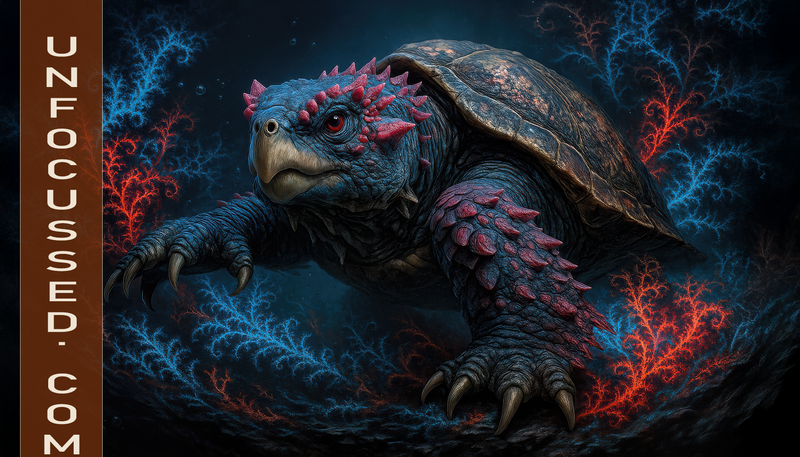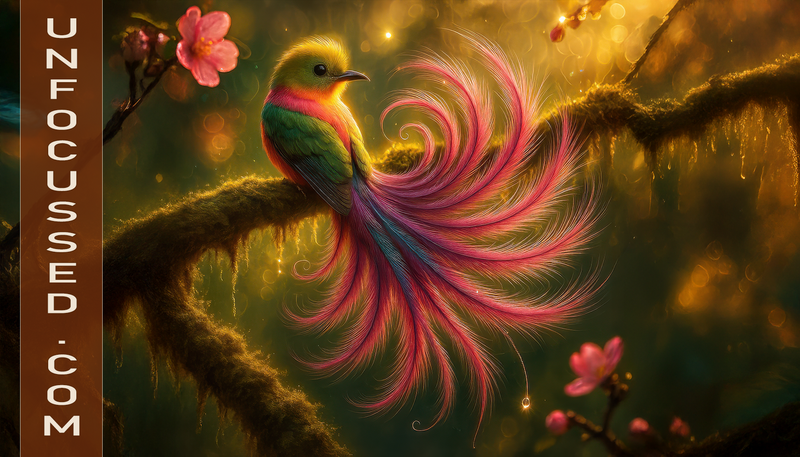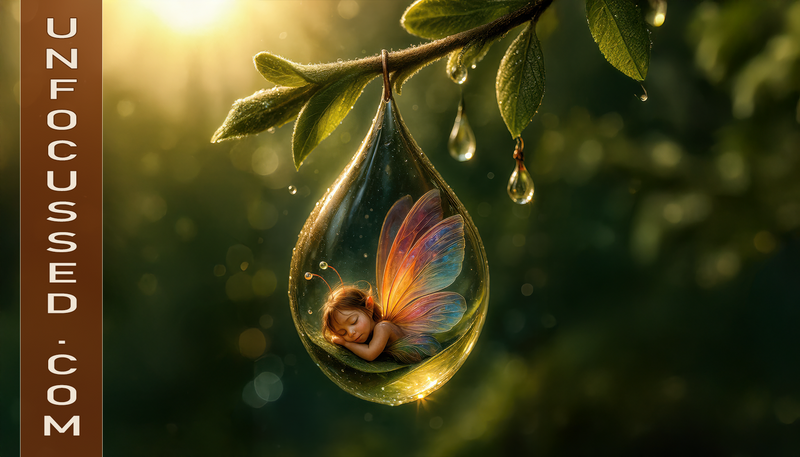The Scandalous Rebirth of Seraphina Muse
Long before she became a muse, Seraphina was a minor chaos deity assigned to the Bureau of Spontaneous Laughter. Her job involved distributing ill-timed giggles during funeral services, awkward wedding toasts, and tense elevator rides. She did her best, really — but she had a knack for going just a smidge overboard. One time, she made a monk snort so hard during a vow of silence that he ruptured a sacred scroll. That earned her a demotion... and, to be fair, a cult following in the underworld’s meme forums.
Eventually, the Department of Divine Vibes had no choice but to put her on “Creative Probation.” She had one last shot at redemption: to live a mortal life as an artist’s muse and inspire something truly beautiful—without triggering any mass nudity incidents or disco plague outbreaks. No pressure.
Seraphina was flung into the mortal plane with nothing but her laugh (which sparkled like champagne and slightly echoed with goat noises) and a kaleidoscopic wrap dress made of cosmic threads. She arrived mid-spin in a sunflower field during golden hour, startling a painter named Emil who was trying to sketch a very serious still life of a dead pineapple.
“Oh sweet cosmos,” Emil gasped, dropping his sketchbook and sanity simultaneously. “Are you... real?”
Seraphina winked. “Define ‘real,’ darling.”
And thus began the Great Artistic Reawakening of Emil Brandt, formerly known as the most tragically constipated artist in his district. His oils had dried, his palette knives had dulled, and his soul had the texture of plain toast. But with Seraphina’s arrival? Suddenly he was painting like a caffeinated octopus on a sugar high. Portraits, abstracts, living walls of swirling emotion—and one entire mural of her left eyebrow, because, as he put it, “the arch contains multitudes.”
But while Emil painted, Seraphina... watched. Observed. Laughed. Flirted with moonbeams. Made his cat speak French. And deep within, something strange began to blossom. For the first time in her chaotic existence, Seraphina felt something that wasn’t just amusement or the mischievous urge to switch everyone’s underpants inside out telepathically.
She felt... invested.
Because as it turned out, being a muse wasn’t about being admired—it was about awakening. Stirring something bold and brave and impossibly beautiful in someone else. And maybe—just maybe—that was the kind of magic worth sticking around for.
...Or maybe it was just the coffee. Mortals had truly perfected that drug.
The Gallery of Mostly Accidental Genius
The next few months were a kaleidoscopic montage of late-night paint flinging, whispered provocations, and ill-advised energy drinks brewed with starlight and a hint of peppermint chaos. Emil’s flat—once the epitome of existential beige—was now a jungle of canvases, spilled pigment, laughing plants, and at least two sentient paintbrushes who insisted on unionizing.
And Seraphina? She was thriving. More mortal by the day, in the best of ways—she had learned how to make pancakes (badly), flirt with delivery drones (successfully), and binge-watch supernatural soap operas (obsessively). But most importantly, she'd learned how to fall in love—not just with Emil, though that was happening at a pace that would make even Aphrodite raise a perfectly plucked brow—but with inspiration itself. Not the grand, thundering muse-y kind either, but the gentle, awkward, totally unphotogenic moments like watching Emil try to paint while sneezing, or the way he swore at his canvas like it owed him money.
It all crescendoed into the event neither of them saw coming: The Annual Neo-Romantic Art Gala.
The invitation came in an envelope made of recycled rumors and sealed with glitter-glue vengeance. Emil was to be the featured artist—an anonymous patron had submitted his work and paid the entrance fee in gold teeth and espresso loyalty cards. At first, Emil protested, because he was Emil and full of artistic angst and unresolved drama with a loaf of sourdough in his fridge. But Seraphina put her cosmic foot down.
“You're going. I'm going. And you're going to wear the good boots. No, not those. The ones that say ‘I paint heartbreak and can salsa.’”
When they arrived at the gala, the room went still. Or rather, it tried to. One woman fainted into a vat of guava wine. Someone dropped their monocle into a shrimp cocktail. The staff dog, Gregory, sat up straighter and gave Seraphina a gentlemanly nod. Because Seraphina, in her element, wearing a gown made entirely of stitched moonlight and dangerously high expectations, was not simply a muse—she was a movement.
Her dress shimmered with her every mood—flaring rose-gold with flirtation, stormy violet when bored, and once, dramatically, deep chartreuse when she spotted her ex-colleague and long-time nemesis: Thalia of the Whispering Moods.
Thalia. Oh, Thalia. Muse of Serious Poetry, Dramatic Sighs, and the occasional overpriced candle line. She swept through the crowd in a gown made of broken promises and seasonal depression, clutching a wine glass that somehow always stayed full and only drank tears of misunderstood poets.
“Seraphina,” Thalia purred. “How... quaint. You’ve chosen to dabble in human creativity. Again.”
“Thalia,” Seraphina replied with the poise of someone who once seduced a time vortex into running late. “Still collecting sad boys like Pokémon cards, I see.”
The tension could have sliced a croissant.
But there was no time for muse-on-muse drama, because Emil’s collection had just been unveiled—and it was spectacular. Giant canvases pulsed with color and motion. Portraits that breathed, abstracts that whispered, and one disturbingly seductive painting of a croissant mid-fall that earned three offers and a marriage proposal. The centerpiece? A breathtaking portrait of Seraphina, caught mid-laughter, wrapped in swirls of color and light like she’d been caught dancing with the northern lights.
The room fell to hush.
Thalia, looking suddenly less smug, narrowed her eyes. “That’s not mortal talent,” she hissed. “You’ve cheated.”
“He found his own inspiration,” Seraphina replied, letting her dress shift into a blaze of sunbeam yellow and pride. “All I did was stop laughing long enough to watch him find it.”
Thalia tried to protest, but at that moment, the painting of Seraphina laughed. Not metaphorically. Literally. It laughed—out loud. A rich, rolling laugh that echoed through the gallery and triggered spontaneous interpretive dance in at least seven attendees. The spell was broken. Or made. It didn’t matter. The magic had worked.
Emil was swarmed with press, collectors, and at least one cult recruiter. But he only had eyes for her. Later, under a quiet archway far from the clamor and champagne-fueled art critics, he asked her the question that had been quietly blooming between brushstrokes and shared pancakes for weeks.
“What happens now, Seraphina?”
She smiled, and her dress turned the soft pink of post-laughter intimacy. “Now?” she said, her voice a curl of perfume and mischief. “Now we make something even more dangerous than art...”
“What’s that?” he whispered, a little dazed.
“A life.”
And for the first time in her long, bizarre, glitterbomb existence, Seraphina Muse didn’t just feel inspired. She felt home.
The Echoes That Linger After the Laugh
It should’ve ended in bliss. In brunches and paint-streaked kisses. In happily ever afters and montages scored with whimsical cello. But this is a story about a Muse—and muses don’t retire to suburbia with a Pinterest board and a joint savings account.
One morning, while Emil slept tangled in a blanket that Seraphina swore had developed a mild crush on him, the sky above their little art-filled flat cracked like a dropped wine glass. A rift opened in the clouds, raining shimmering letters onto the rooftop garden. Each letter landed with a dramatic flair that screamed “divine bureaucracy”. It was a summons.
Seraphina Muse. Return Immediately. Probation Ended. Evaluation Pending. Dress Code: Formal. No Glitter.
“No glitter?!” she cried, clutching the paper like it had personally insulted her aura.
She tried to ignore it. Pretended it was junk mail. Threw it into a planter. But the letter kept reappearing—on mirrors, inside fruit, once inside Emil’s left boot. Eventually, the celestial HR department sent a messenger: a flaming pigeon named Brian who only spoke in passive-aggressive haikus.
Seraphina had a choice. Return, and be judged. Stay, and... fade. Slowly. Beautifully. Tragically. Like a soap bubble in a cathedral. Muses could live among mortals, yes—but not indefinitely. They were creatures of divine purpose, and their magic, left untended, would eventually burn itself out, like a candle trying to light its own wax.
So she did what any chaotic cosmic being would do. She made a spreadsheet of pros and cons. Then burned it. Then cried in the bathtub with her dress wrapped around her like a security blanket that occasionally hummed old show tunes.
She didn’t tell Emil. She couldn’t. What would she say? “Hey, babe, this has been great, but I might get audited by Olympus and vanish into metaphysical paperwork”? No. Instead, she painted with him. Danced with him. Loved him like she was trying to tattoo her laughter into his memory.
And then, on a Tuesday that smelled like citrus and unfinished conversations, she left.
No note. Just a single, strange gift left on the easel: a loaf of sourdough, perfectly toasted, with a swirl of paint across its crust that shimmered like a galaxy. Inside, carved in burnt crumbs, was a single message: “Paint me free.”
What followed was Emil’s “Mystery Phase.” His art exploded into surreal masterpieces—suns made of sighs, women laughing out of waterfalls, dreamscapes where cosmic dresses unraveled into stars. He never spoke publicly of Seraphina, though collectors begged. He simply painted. And in every gallery, every café, every street corner where his work appeared, someone would inevitably start to laugh. Quietly at first, then uncontrollably. And always—always—with joy.
Back in the celestial realm, Seraphina faced her trial. It was held in a court made entirely of forgotten poetry and awkward hugs. The Council of Muses peered down at her with faces like thunderstorms wearing too much perfume.
“You disobeyed,” Thalia snapped. “You interfered. You formed... attachments.”
“Damn right I did,” Seraphina said, standing in a blazer made of midnight and confidence. “And I inspired more in one mortal’s mess of a heart than your entire department did last century.”
The courtroom gasped. Somewhere, a metaphor fainted.
“Then prove your worth,” the council boomed. “One final act. Inspire something eternal.”
She smiled.
She laughed.
And she reached into her pocket, pulled out a tiny vial of swirling color—paint Emil had once spilled in a moment of distracted love—and flung it across the sky.
The stars shifted.
A new constellation bloomed—chaotic, lovely, slightly unbalanced. It formed the shape of a laughing woman, hair swirling, eyes ablaze. A muse, eternal not because she was divine, but because someone down below had refused to forget her.
Years later, Emil—old now, glorious in silver and age spots—taught art in a sunlit studio above a bakery. His students knew little about his past, save for the giggling portraits and one rule he insisted upon:
“Paint what makes your soul laugh,” he’d say. “And if something magical ever kisses your life... don’t try to keep it. Just honor it.”
One night, he looked up at the stars. Saw her shape there. Smiled through tears.
And swore, for the briefest moment, he heard her whisper, “Nice boots.”
She had always loved those damn boots.
Bring “The Laughing Muse” into your world... If this tale stirred your soul or sparked a mischievous smile, let the magic live on. Our gallery-quality canvas print turns any room into a sanctuary of creativity. Carry a little enchantment wherever you go with the vibrant tote bag, perfect for books, brushes, or secrets. Wrap yourself in inspiration with our luxurious wall tapestry, a statement piece that brings life to any space. And for moments when laughter needs to travel, the greeting card is your muse-in-a-envelope—perfect for sharing magic with others.
Each piece is printed with care, bursting with color, story, and joy—just like Seraphina herself. Explore the full collection and let your walls whisper a little muse-worthy mischief.





















































